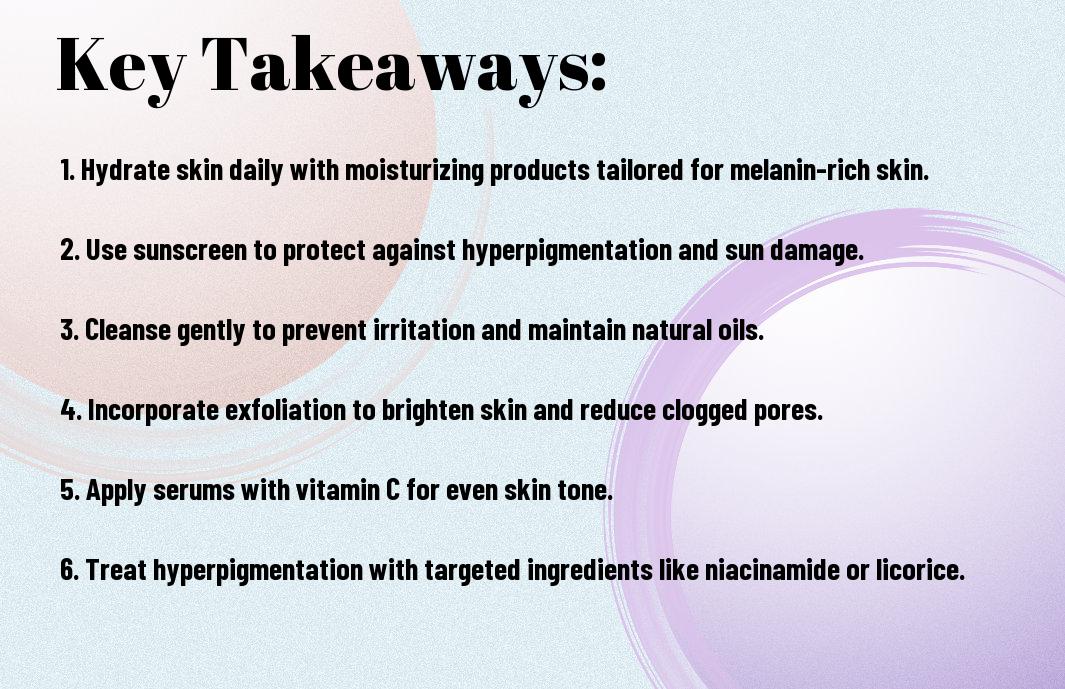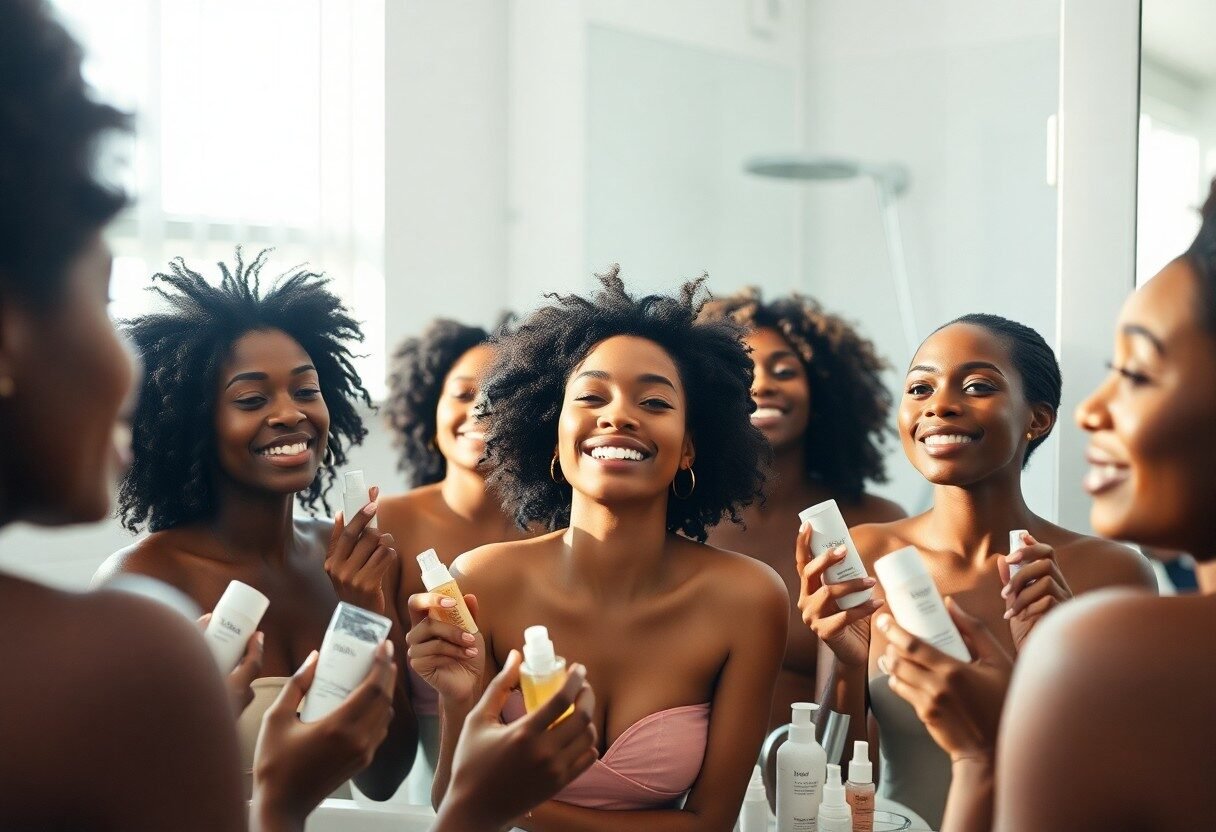
It’s important to understand that Black women often face unique skincare challenges, from hyperpigmentation to dryness. I want to share the key steps and products to help you achieve a radiant complexion. By tailoring your regimen to your skin type and addressing specific concerns, you can enhance your natural beauty. Whether you’re battling acne or seeking to keep your skin supple, you deserve to feel confident in your own skin. Let’s look into the important components of an effective skincare routine designed specifically for your needs.
Key Takeaways:
- Focus on hydration by using moisturizers that contain ingredients like hyaluronic acid and shea butter, which are great for maintaining skin moisture.
- Sunscreen is vital year-round; opt for broad-spectrum SPF 30 or higher to protect against UVA and UVB rays, minimizing the risk of hyperpigmentation.
- Incorporate gentle cleansing methods that avoid over-drying the skin; consider creamy or oil-based cleansers suitable for your skin type.
- Exfoliation should be done moderately with products that contain chemical exfoliants like AHAs or BHAs to promote cell turnover without irritation.
- Target specific skin concerns such as acne or dark spots with serums containing ingredients like niacinamide, vitamin C, or retinol.
- Consider your skin type (oily, dry, combination) when choosing products, and adjust your regimen seasonally to accommodate changes in humidity and temperature.
- Regularly incorporate preventative measures such as a balanced diet and adequate hydration to enhance overall skin health and resilience.

Tailored Cleansing Techniques for Melanin-Rich Skin
Emphasizing effective cleansing techniques is important for maintaining healthy melanin-rich skin. Cleansing should focus on removing impurities without stripping important moisture. Adopting a customized approach can help you promote a balanced complexion, reduce breakouts, and prevent dryness, ultimately revealing the skin’s natural radiance.
Choosing the Right Cleanser for Your Skin Type
Selecting the appropriate cleanser hinges on understanding your specific skin type. For instance, if your skin tends to be oily, a foaming cleanser with salicylic acid can help eliminate excess oil and prevent breakouts. Alternatively, if your skin leans towards dryness, opting for a creamy, hydrating cleanser will keep your moisture barrier intact. Knowing your skin type allows you to target its unique needs effectively.
Importance of Double Cleansing in Evening Routine
Double cleansing at the end of your day is a game changer when it comes to effectively removing makeup, sunscreen, and daily grime from your skin. The first cleanse—typically with an oil-based product—dissolves makeup and oil, while the second cleanse with a water-based formula cleans the skin more deeply. This two-step process minimizes the risk of clogged pores and ensures that your skin can breathe overnight, ultimately supporting cellular renewal and a brighter complexion.
Implementing double cleansing into your evening routine can significantly impact your skin’s health. Studies reveal that just one cleanse often leaves behind residue, leading to potential breakouts and dullness. By using an oil cleanser first, you effectively lift away makeup and impurities. Following that with a gentle water-based cleanser ensures that any remaining dirt is washed away, preparing your skin to absorb serums and treatments better. I’ve seen firsthand how this method enhances my complexion, making it brighter and more vibrant over time.
Moisturization: The Key to Hydration and Balance
Achieving and maintaining hydration is necessary for healthy skin, especially for Black women who may experience varied skin types. Moisturizers play a vital role in locking in moisture, preventing dryness, and creating a balanced skin barrier. Incorporating a daily moisturizer helps replenish lost hydration and protects against environmental aggressors. You’ll want to choose formulations that not only hydrate but also cater to your unique needs, ensuring your skin feels soft and nourished throughout the day.
Lightweight vs. Rich Moisturizers: What Works Best?
Choosing between lightweight and rich moisturizers depends largely on your skin type and personal preference. Lightweight formulations, often gel-based, are great for oily or combination skin as they provide hydration without overwhelming your pores. Conversely, rich moisturizers, cream-based and thicker, are ideal for dry or sensitive skin, ensuring a deep level of nourishment. Understanding your skin’s needs helps in selecting the right product for optimal hydration.
Ingredients to Look for in Moisturizers
When selecting a moisturizer, focus on ingredients that cater specifically to your skin’s needs. Look for hyaluronic acid for its moisture-retaining properties, glycerin to draw moisture into your skin, and shea butter for its rich emollient qualities. Other beneficial ingredients include ceramides that strengthen the skin barrier and niacinamide known for its soothing and brightening effects. Always check for potential allergens or irritants, ensuring the product complements your skincare regimen.
Hyaluronic acid, for example, can hold up to 1,000 times its weight in water, making it incredibly effective at keeping skin plump and hydrated. Glycerin, a powerful humectant, works wonders to maintain moisture levels, making it a daily necessary. If you’re dealing with very dry skin, shea butter provides intense hydration and helps seal in moisture, reducing transepidermal water loss. Adding products rich in these ingredients can significantly improve your skin’s hydration and overall texture, resulting in that coveted radiant glow.
Sun Protection: Why It’s Non-Negotiable
Guarding your skin against the sun’s damaging rays is a fundamental component of any skincare regimen. Prolonged exposure to UV radiation leads to premature aging, uneven skin tone, and an increased risk of skin cancer, which affects all skin types, including melanin-rich skin. Even darker skin is susceptible to these dangers, making sun protection an imperative step that cannot be overlooked.
Understanding UV Rays and Skin Impact
UV rays come in two main forms: UVA and UVB. UVA rays penetrate deep into the skin, contributing to aging and skin cancer, while UVB rays primarily cause sunburn. Even if you don’t burn easily, UV damage can still affect the skin’s health and appearance, emphasizing the importance of protective measures for everyone.
Choosing Sunscreens that Blend Seamlessly
Finding a sunscreen that complements your skin tone can be a game changer. Many brands now offer formulations tailored for darker skin, which absorb quickly without leaving a white cast. Look for products labeled “invisible” or “transparent” for a natural finish, while ensuring they contain broad-spectrum protection and have an SPF of at least 30. Mineral-based formulas with zinc oxide or titanium dioxide can also be beneficial, providing effective protection without irritating sensitive skin.
In the pursuit of the ideal sunscreen, I’ve discovered brands like Black Girl Sunscreen and Neutrogena Ultra Sheer that cater specifically to melanin-rich skin. These products not only provide the necessary UV protection but also hydrate and nourish the skin without an ashy residue. The right sunscreen will effortlessly blend into your complexion, allowing you to enjoy the sun without worrying about an unsightly film or compromising your skincare aesthetic. Always apply generously and reapply every two hours for optimal protection.

Targeting Common Skin Concerns in Black Women
Addressing common skin concerns specific to Black women is important for creating an effective skincare routine. Skin issues such as hyperpigmentation, acne, and scarring can significantly affect both your appearance and self-confidence. Understanding the root causes of these conditions allows you to select appropriate products and treatments that cater to your unique skin needs.
Hyperpigmentation: Causes and Solutions
Hyperpigmentation arises when your skin produces excess melanin, often triggered by factors like sun exposure, hormonal changes, and post-inflammatory responses from acne. Using products containing Vitamin C, retinoids, and AHAs can help fade dark spots. Daily application of sunscreen protects against further darkening, while consistent treatments can gradually promote a more even skin tone.
Acne and Scarring: Effective Treatments
Many women experience acne due to hormonal fluctuations, stress, or incorrect product usage. To treat active breakouts, I recommend using products containing salicylic acid or benzoyl peroxide. Once the blemishes have healed, incorporating formulas with niacinamide or silicone gel sheets can assist in reducing the appearance of scarring.
Preventing and treating acne requires consistent effort. Regularly cleansing your face with a gentle cleanser can help eliminate excess oil without stripping your skin of natural moisture. Following up with exfoliation, ideally 2-3 times a week, keeps pores clear and promotes cell turnover. For persistent scars, consider consulting a dermatologist about options like chemical peels or microdermabrasion, which can provide additional support for a smoother complexion. Ultimately, patience and routine are key to managing acne and scarring effectively.
Seasonal Adjustments: Adapting Your Skincare Regimen
Your skincare routine should shift with the seasons to effectively address the changing conditions your skin faces. As the climate alters, so do the demands for hydration, protection, and rejuvenation. I’ve found that modifying my regimen helps maintain that healthy glow year-round, allowing my skin to thrive regardless of the weather.
Adapting to Humidity and Heat in Summer
In the sweltering summer months, high humidity can lead to increased oil production, often resulting in breakouts. Switching to lightweight, oil-free moisturizers and incorporating gel-based cleansers can help combat excess sebum while keeping skin hydrated. I also prioritize using sunscreen with at least SPF 30 to protect against UV rays, as melanin-rich skin is still susceptible to sun damage.
Nourishing Your Skin in Cold Weather
Cold winter air can strip moisture from your skin, leading to dryness and flakiness. This is the time to embrace thicker creams and rich oils that create a barrier against the elements. Look for ingredients like shea butter or jojoba oil; they’re perfect for providing the extra nourishment needed during these harsh months.
Incorporating a hydrating serum before applying your moisturizer can significantly enhance results during cold weather. Serums containing hyaluronic acid can draw moisture into your skin, while a heavier cream locks it in. I also recommend using a humidifier in your home to maintain moisture levels in the air, which can greatly benefit your skin’s overall hydration. Adjusting your routine to include these elements means you can enjoy soft, supple skin even when facing dry winter conditions.
Final Words
Ultimately, developing an effective skincare regimen tailored to your unique needs as a Black woman can transform your skin’s health and appearance. I encourage you to select products that cater specifically to your skin type and concerns, always prioritizing hydration and sun protection. Incorporating natural ingredients can enhance your routine, while regular exfoliation and moisturizing ensure your skin remains vibrant. By investing time in understanding your skin, you can achieve a radiant glow that reflects your beauty and strength. Your skincare journey is personal, and I’m confident you’ll find what works best for you.
FAQ
Q: What are the imperative steps in a skincare regimen for Black women?
A: A comprehensive skincare regimen typically includes cleansing, toning, moisturizing, and sun protection. The cleansing step should involve a gentle cleanser suited for your skin type, followed by a toner that balances pH levels. Moisturizing helps maintain hydration, and using a broad-spectrum sunscreen every day is vital for protecting against UV damage and preventing hyperpigmentation.
Q: How can Black women address hyperpigmentation in their skincare routine?
A: Hyperpigmentation can be addressed using products that contain ingredients like vitamin C, niacinamide, and alpha hydroxy acids (AHAs). Regular exfoliation, both chemical and physical, can help to remove dead skin cells and promote even skin tone. Sun protection is also key, as exposure to UV rays can worsen pigmentation issues.
Q: Should Black women use different products during the summer vs. winter?
A: Yes, seasonal changes can affect skin’s needs. In summer, lighter, oil-free moisturizers and gel-based products may be beneficial to control increased oiliness and sweat. In winter, richer creams that provide intense hydration are recommended to combat dryness caused by colder temperatures.
Q: What specific ingredients should Black women look for in their skincare products?
A: Ingredients such as shea butter, jojoba oil, hyaluronic acid, and glycerin are excellent for hydrating and nourishing Black skin. Additionally, products with antioxidants like vitamin E and C can help protect the skin from environmental damage, while retinoids can be effective for anti-aging and improving skin texture.
Q: How often should Black women exfoliate their skin?
A: Exfoliation frequency can vary depending on skin type. Generally, it’s advised to exfoliate 1-3 times a week. For those with sensitive skin, once a week may be sufficient, while those with oilier skin types might benefit from more frequent exfoliation. It’s imperative to adjust based on skin’s response.
Q: Can dietary choices affect the skin’s health for Black women?
A: Absolutely, a balanced diet rich in fruits, vegetables, and healthy fats can improve skin health. Antioxidant-rich foods such as berries, nuts, and green leafy vegetables can support vibrant skin. Staying hydrated is also imperative; drinking plenty of water helps to maintain moisture levels in the skin.
Q: What role does sun protection play in skincare for Black women?
A: Sun protection is vital for all skin types, including darker skin tones. While melanin offers some natural protection against UV rays, it doesn’t prevent sun damage or the risk of skin cancer. A broad-spectrum SPF of at least 30 should be applied daily, even on cloudy days or indoors, to protect the skin from pigmentation and ensure overall skin health.











